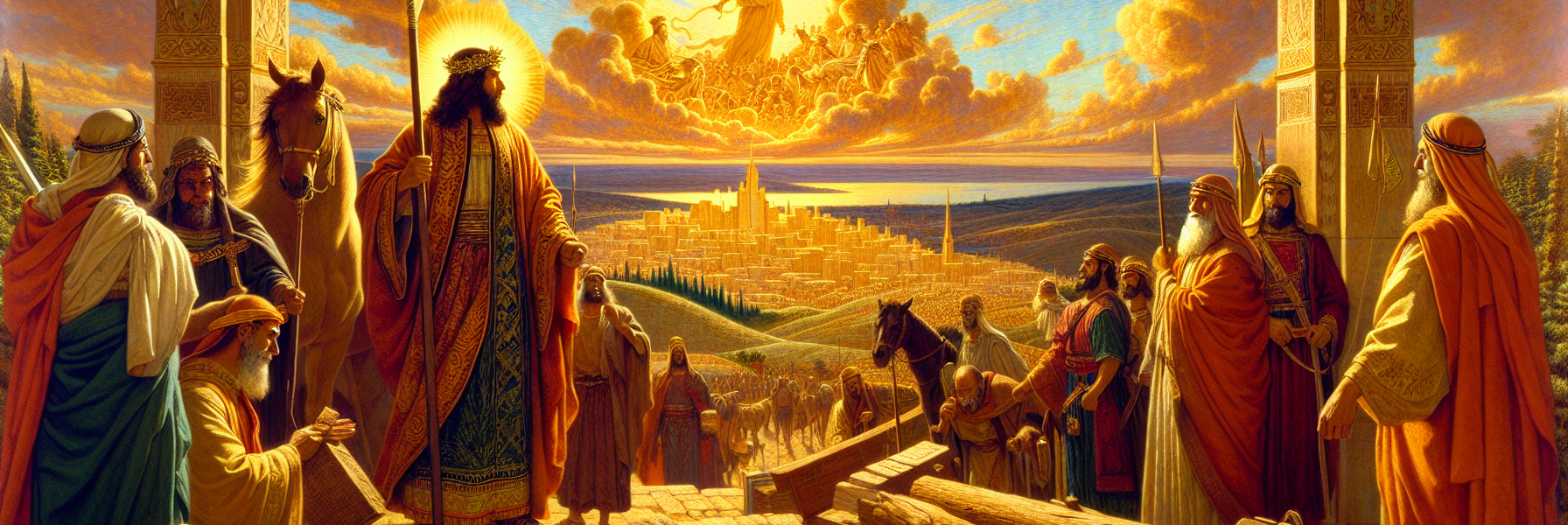**The Rise of King David: Victory and Divine Favor**
The sun hung low over the hills of Judah, casting golden rays upon the newly established capital of Israel—Jerusalem. The city buzzed with excitement, for King David, the shepherd-turned-king, had been firmly established on the throne. The Lord had exalted him, and the kingdom was now united under his rule. News of his anointing had spread far and wide, reaching even the courts of distant nations.
### **A King Recognized by Nations**
Word soon came to Hiram, king of Tyre, a powerful Phoenician ruler whose lands bordered Israel. Recognizing David’s favor with God, Hiram sought to forge an alliance. He sent messengers bearing gifts of cedar logs, skilled craftsmen, and stonemasons to build a palace fit for the Lord’s anointed. As the fragrant cedar wood was unloaded in Jerusalem, the people marveled, for it was a sign that even foreign kings acknowledged David’s divine appointment.
David understood that this was not his own doing but the hand of the Lord. He had been taken from the pastures, from tending sheep, to shepherd the nation of Israel. And now, as his palace rose majestically within the stronghold of Zion, he knew that every blessing came from above.
### **A Growing Household**
In those days, David took more wives, as was the custom of kings in neighboring lands, and he was blessed with many children. Sons and daughters were born to him in Jerusalem, each a reminder of God’s faithfulness. Among them were Shammua, Shobab, Nathan, Solomon, Ibhar, Elishua, Elpelet, Nogah, Nepheg, Japhia, Elishama, Beeliada, and Eliphelet. The royal household flourished, and the kingdom grew in strength.
Yet David did not allow prosperity to blind him. He remembered the words of the prophet Samuel and the Law of Moses, knowing that a king’s heart must remain steadfast before the Lord.
### **The Philistine Threat**
But peace was not to last. The Philistines, Israel’s ancient enemies, heard that David had been anointed king over all Israel. Fear and rage stirred in their hearts, for they had long dominated the land through brute force and feared a united Israel under a strong ruler. Determined to crush David before his power grew, they mobilized their armies and marched into the Valley of Rephaim, a strategic plain near Jerusalem.
When word reached David that the Philistines were spreading out across the valley, seeking to overthrow him, he did not act in haste. Instead, he turned to the Lord, inquiring, “Shall I go up against the Philistines? Will You deliver them into my hand?”
The Lord answered him clearly: “Go up, for I will deliver them into your hand.”
### **The First Battle: Baal-Perazim**
With divine assurance, David rallied his mighty men—warriors like Joab, Abishai, and Benaiah, men whose loyalty and strength were unmatched. They descended upon the Philistines at Baal-Perazim, a name which would later mean “The Lord Who Breaks Through.”
The battle was fierce. The Philistine forces, confident in their numbers and weaponry, clashed with Israel’s army. But the Lord fought for David. Like a sudden storm, divine power broke through the enemy ranks. The Philistines were thrown into confusion, their lines shattered. They fled in terror, abandoning their idols on the battlefield.
David and his men seized the abandoned idols and burned them, as the Law commanded, ensuring no false god would be worshipped in Israel. The victory was decisive, and the people praised the Lord, who had shown Himself strong on their behalf.
### **The Second Attack: The Sound of Marching**
Yet the Philistines were not so easily deterred. Humiliated, they regrouped and launched another invasion, once again spreading across the Valley of Rephaim.
This time, David did not assume the same strategy would work. He returned to the Lord, seeking fresh guidance. The Lord answered with a surprising command: “Do not go straight up, but circle around behind them and attack them in front of the balsam trees. As soon as you hear the sound of marching in the tops of the balsam trees, move out to battle, because that will mean God has gone out in front of you to strike the Philistine army.”
David obeyed without hesitation. He led his forces not by his own wisdom but by divine instruction. As they positioned themselves near the balsam groves, a strange sound filled the air—a rustling, like the footsteps of an unseen army moving through the treetops. It was the sign.
“Advance!” David commanded.
The moment Israel’s forces charged, the Philistine ranks broke. The Lord Himself had gone before them, striking the enemy with terror. The Philistines were routed, fleeing all the way back to their cities of Gath and Ekron. The path was littered with their dead, a testament to God’s power.
### **A Kingdom Established**
News of David’s victories spread like wildfire. The surrounding nations trembled, for they saw that the God of Israel was with David. The Lord had made his name great, not for his own glory, but so that all would know the Almighty reigns.
From that day forward, David’s kingdom grew in strength and honor. The Philistines, once a constant threat, were subdued. The Lord gave David rest from his enemies on every side, and the king used this peace to seek the Lord’s heart, to worship, and to prepare for the great work yet to come—the building of God’s dwelling place.
And so, the reign of David stood as a testimony: when a leader seeks the Lord above all, victory is assured, for the battle belongs to God.




